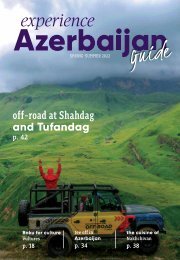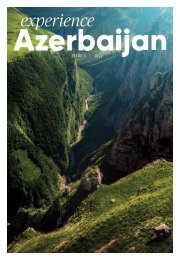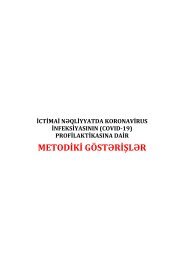Wine_EN
Create successful ePaper yourself
Turn your PDF publications into a flip-book with our unique Google optimized e-Paper software.
şərəfə<br />
cheers<br />
Contents:<br />
fabulous vineyards<br />
cultivated connoisseurs<br />
wine history<br />
in Azerbaijan<br />
grape<br />
types<br />
wine regions<br />
of Azerbaijan<br />
2<br />
4<br />
7<br />
8<br />
Ganja-Gazakh<br />
and the Lesser Caucasus<br />
different tastes<br />
unique experiences<br />
unearth the flavours<br />
with delightful wines<br />
wine bars<br />
in Baku<br />
27<br />
34<br />
36<br />
40<br />
Azerbaijan, an ancient cradle of viniculture, is once<br />
again coming of age. Beautifully balanced wines are<br />
made with love from grapes grown on Caucasian slopes,<br />
soaked in sunshine and soothed by Caspian breezes.<br />
Come... Taste... Delight...<br />
Caspian<br />
shoreline<br />
11<br />
salam<br />
Azerbaijan<br />
44<br />
Shirvan<br />
and the Caucasian foothills<br />
17<br />
useful wine<br />
vocabulary<br />
45
WINEMAKING IN AZERBAIJAN<br />
fabulous vineyards<br />
cultivated connoisseurs<br />
Azerbaijan is a country of fascinating surprises. The<br />
dazzling 21 st -century architecture of Baku. The glitzy<br />
ski resorts of Shahdag and Tufandag. The Silk Route<br />
gem-city of Sheki... And, yes, the wonderful wine.<br />
Azerbaijan is very proudly a secular,<br />
multicultural country, a place of<br />
passionate Caucasian spirit, and one<br />
of the cradles of world viticulture. The<br />
capital buzzes with bars. Fine wines are<br />
very much part of many an Azerbaijani<br />
dining experience. And the vineyards of<br />
the Caucasus foothills produce a bounty<br />
of grapes that soak up the rich sunshine,<br />
producing vintages that are likely to<br />
surprise and delight.<br />
Azerbaijan’s wine industry has<br />
been expanding rapidly over the last<br />
decade with extensive investments in<br />
top quality technology, and a playful<br />
experimentation with both internationally<br />
known grape varieties and many local<br />
alternatives. The result is an original and<br />
ever-improving gamut of fine wines.<br />
Come, taste and surprise yourself.<br />
<strong>Wine</strong>ries & <strong>Wine</strong> Tours<br />
While some families do make their<br />
own wines – notably in the culturally<br />
unique village of Ivanovka or in the<br />
Gazakh region – most of Azerbaijan’s<br />
production comes from larger<br />
companies with access to a wide<br />
variety of vineyards. This provides the<br />
conditions for a similarly wide variety of<br />
grape types to be grown which in turn<br />
facilitates some imaginative blending.<br />
Many of the top producers now offer<br />
factory tours and have tasting rooms –<br />
often very attractive places where you<br />
might also sample fine brandies and<br />
vodkas.<br />
As well as the classics, Azerbaijan<br />
also has a fast-growing demand for<br />
other non-grape wines, most notably<br />
full-flavoured pomegranate wines which<br />
are a current favourite amongst Baku’s<br />
younger social circles and tourists visiting<br />
our country. The best-known versions<br />
are made by Az-Granata (Agsu) and<br />
Tovuz-Baltiya (Tovuz), which can also be<br />
tasted during the traditional Goychay<br />
Pomegranate Festival held every year in<br />
early November.<br />
Discover more at:<br />
azerbaijanwine.com/<br />
azerbaijanwine.az<br />
2 3
WINEMAKING IN AZERBAIJAN<br />
wine history<br />
in Azerbaijan<br />
Millennia ago, long before<br />
the Caucasus region was<br />
divided up into nation<br />
states, people living here<br />
were cultivating grapes,<br />
and pretty soon they had<br />
the great idea of crushing<br />
them to make wine. One of<br />
Noah’s first impulses after<br />
surviving the flood was to<br />
plant a vineyard... And to<br />
drink rather excessively<br />
of the wine that it yielded.<br />
According to firmly believed<br />
local legend, Noah’s<br />
post-ark settlement was<br />
founded at what’s now<br />
the Azerbaijani city of<br />
Nakhchivan – where there’s<br />
even a tomb site of Noah<br />
that you can visit.<br />
4 5
WINEMAKING IN AZERBAIJAN<br />
grape<br />
types<br />
6<br />
Azerbaijan’s wineries make<br />
extensive use of wellknown<br />
grape varieties<br />
including Merlot, Pinot Noir<br />
and Cabernet Sauvignon,<br />
Chardonnay, Viognier, and<br />
Pinot Blanc. But there are<br />
also several important<br />
Pan-Caucasian and local<br />
varietals. For now, many<br />
of those are little more<br />
than historical curiosities,<br />
though there is a new<br />
drive to revive some old<br />
strains. However, it’s well<br />
worth familiarizing yourself<br />
with the following varieties<br />
which are commonly used<br />
in Azerbaijani wines.<br />
Red<br />
Matrasa<br />
Also variously known as Matrassa,<br />
Madrese, Qarashira, Siray and by several<br />
other names. Round and waxy, the blueblack<br />
grapes are sweet and very juicy,<br />
grown especially in the Shamakhi region<br />
where a wine-growing village shares the<br />
grape’s name. Predominantly used in<br />
coupage with other varietals, it tends to<br />
produce tannic, richly coloured red wines<br />
but also citrusy rosés with a long finish.<br />
Shirvanshahi<br />
Local people living in the Kurdemir region<br />
and the valley of the Kur River have<br />
grown this grape for centuries. It has a<br />
dark colour and is mainly used for kagortype<br />
dessert and late-harvest wines<br />
high in residual sugar. It goes especially<br />
well with desserts, cakes and all sorts of<br />
sweets. The most popular wine produced<br />
from Shirvanshahi grapes is called<br />
‘Kurdemir’.<br />
Meleyi<br />
Dark-coloured table and dessert wines<br />
are produced from this sort which is<br />
late to ripen (in early October) but<br />
highly productive. Although there are no<br />
Meleyi-based wines currently for sale, the<br />
grapes are being cultivated by Chabiant<br />
and Shirvan <strong>Wine</strong>s for production in the<br />
coming years.<br />
Khindogny<br />
This local sort of Azerbaijani wine is<br />
sufficiently widespread and included<br />
in the ‘List of Standard Varieties’<br />
recommended for cultivation in the<br />
country. Khindogny grapes are very dark<br />
in colour and have been cultivated for<br />
up to 300-500 years, some even for<br />
several millennia. <strong>Wine</strong>s from this grape<br />
are high-quality and possess a beautiful<br />
colour and pleasant fragrance.<br />
White<br />
Bayanshira<br />
Also known as Bayanshire, Shirei and by<br />
other names, this sort grows quickly<br />
and is resilient to drought, making it a<br />
popular grape to grow in less irrigated<br />
zones. Traditionally its reputation was not<br />
especially glowing as a single varietal<br />
but treated with care, some contemporary<br />
wineries have managed to tease out<br />
crisply mineral white wines with lingering<br />
lemon notes. More often the grape is<br />
used as a blend with Rkatsiteli, adding a<br />
pleasantly citrus acidity.<br />
Misgali<br />
Misgali is a local sort whose name<br />
means ‘measuring unit’ in Azerbaijani. It<br />
has a high and stable productivity and<br />
is especially suitable for producing table<br />
wines.<br />
Arna-Guirna<br />
Arna-Guirna is a local sort mostly<br />
cultivated in the regions of Sharur,<br />
Sadarak, Babak and Ordubad in small<br />
quantities. Mostly used for table and dry<br />
wines, its aroma is a bouquet of fresh<br />
tropical fruits while the taste is wellstructured,<br />
with pleasant savoury notes<br />
and a long mineral finish.<br />
Rkatsiteli<br />
Originally Georgian but also one of the<br />
most popular white-wine grapes in<br />
Azerbaijan, Rkatsiteli ripens slowly with<br />
a potentially high sugar content and<br />
a taste that’s fresh and juicy, creating<br />
wines that can become heavily fruity<br />
and mildly tannic when matured in oak.<br />
Though somewhat sensitive to drought,<br />
the vines are seen as helpfully phylloxera<br />
resistant. The name means ‘red vine<br />
shoot’ in Georgian.<br />
7
WINE REGIONS<br />
OF AZERBAIJAN<br />
wine regions<br />
of Azerbaijan<br />
While Azerbaijan doesn’t<br />
have strictly defined<br />
vinicultural regions like<br />
France’s AOC (appellation<br />
d’origine controlée)<br />
system, most major<br />
wine producers fall<br />
geographically along<br />
three main routes that fan<br />
out from Baku. They span<br />
north along the Caspian<br />
shoreline, west through<br />
Shirvan along a beautifully<br />
varied road that follows<br />
the foothills of the Greater<br />
Caucasus, and west on<br />
a more southerly route<br />
through the centre of the<br />
country via historic Ganja.<br />
Inexpensive car hire makes<br />
it relatively affordable<br />
to visit a selection of<br />
the country’s wineries.<br />
However, since you’ll no<br />
doubt want to taste plenty<br />
of the wines en route, you<br />
might prefer to join a tour.<br />
8<br />
9
WINE REGIONS<br />
caspian<br />
shoreline<br />
From the north shore of<br />
the Absheron Peninsula<br />
to the Russian border<br />
at the Samur River<br />
lies a narrow strip of<br />
coastal plain from which<br />
rise the foothills of the<br />
Greater Caucasus<br />
Mountains. Historically<br />
the route of traders<br />
and invaders, these<br />
lands were guarded by<br />
three fortified pinchpoints<br />
with fortresses<br />
whose ruins still create<br />
impressive scenes for<br />
travellers. As a wine<br />
terroir, the land is a<br />
curiosity, with a rich<br />
minerality, swirling<br />
sea breezes and<br />
concentrated sunshine<br />
producing wines that<br />
can be explosively fiery<br />
and highly original.<br />
<strong>Wine</strong>ries<br />
A short drive from Baku, Marandi is one<br />
of Azerbaijan’s foremost new-breed wineries,<br />
welcoming to visitors and producing<br />
a growing range of well-balanced<br />
wines, many grown in Fireland vineyards<br />
that lie on the Absheron Peninsula<br />
between two salt lakes, close to some<br />
intriguing mud volcanoes. In all, some 15<br />
grape varieties are now cultivated on 160<br />
hectares of land producing several wine<br />
ranges: refined Yalli, premium Terra Caspea<br />
and Terra Caucasea plus the softer,<br />
easy-drinking Ilkin table wines.<br />
Further north, close to the town of<br />
Siyazan, Caspian Coast produces the<br />
Hamya, Shani and Four Season brands.<br />
Originally founded in 1970, it was modernized<br />
a decade ago when all its<br />
production equipment was entirely replaced.<br />
Relative newcomer Merit Brand<br />
has around 150 hectares under grape in<br />
the Shabran region. Overseen by master<br />
vintner Jamaladdin Zeynalov, their range<br />
of dry red wines includes the Golden<br />
Shabran, Mirvari, and La Perla brands.<br />
Discover more at<br />
azerbaijanwine.com/<br />
azerbaijanwine.az<br />
10<br />
11
WINE REGIONS<br />
what to see<br />
and do<br />
Enjoy a Baku wine crawl<br />
Baku is alive with a<br />
smorgasbord of tempting<br />
restaurants and enticing<br />
drinking holes across all<br />
price ranges, most serving<br />
a range of wines. Better<br />
still, several excellent wine<br />
bars such as KEFLI Local<br />
<strong>Wine</strong> & Snacks, Saqi <strong>Wine</strong><br />
Bar and Enoteca Meydan<br />
are conveniently located in<br />
and around the city centre<br />
meaning that in between<br />
sipping the many flavours<br />
of Azerbaijani wine, you<br />
can stroll around Baku’s<br />
most popular sights.<br />
Tours of Fireland<br />
Fireland’s tours include<br />
a look at the factory,<br />
degustations, lunch or<br />
dinner featuring national<br />
dishes and fish from the<br />
nearby Caspian Sea,<br />
and options to purchase<br />
wines at favourable<br />
prices.<br />
Stroll through the city centre<br />
Nestled in the heart of Eurasia, Baku combines the best of East and West. Here you’ll<br />
discover ambitious 21 st -century architecture, European elegance and a medieval old<br />
city, as well as buzzing bistros and vibrant nightlife. Whether unravelling the mysteries<br />
of the Maiden Tower, nosing about museums or shopping in high-end boutiques,<br />
there’s something for everyone in the Azerbaijani capital. A great place to start is by<br />
taking a free walking tour.<br />
12<br />
13
WINE REGIONS<br />
Discover Azerbaijan’s fire legacy<br />
Baku’s energy-rich landscape<br />
amazed travellers as early as<br />
Marco Polo, and while the earth<br />
no longer throws out spontaneous<br />
bursts of flame, the Ateshgah Fire<br />
Temple is testament to a time when<br />
Zoroastrian and Hindu pilgrims<br />
flocked here to worship them. Built<br />
in the 17 th -18 th centuries around a<br />
naturally burning flame, the site<br />
now functions as a well-designed<br />
museum recounting the lives and<br />
beliefs of those that ventured here.<br />
Combine this with a trip to nearby<br />
Yanardag (‘Burning Mountain’),<br />
where the last flames continue to<br />
blaze on the hillside.<br />
inside knowledge<br />
Take tours to Gobustan and the<br />
mud volcanoes<br />
From prehistoric artworks to a<br />
state-of-the-art museum, the<br />
past of the Azerbaijani people<br />
comes dramatically to life in the<br />
Gobustan preserve, a UNESCOlisted<br />
World Heritage site<br />
home to over 6,000 prehistoric<br />
petroglyphs spanning 20,000<br />
years, as well as a Roman<br />
inscription from the 1 st century<br />
AD – the furthest east one has<br />
ever been seen! While here<br />
don’t miss the chance to see<br />
some of Azerbaijan’s roughly 350<br />
mud volcanoes, the greatest<br />
concentration of this rare natural<br />
phenomenon anywhere in the<br />
world.<br />
Ivan Uvarov, Co-founder of Kefli:<br />
“<br />
“<br />
Three years ago there was nowhere to drink local wine in Baku.<br />
We love wine and we wanted Azerbaijanis to drink and rediscover<br />
their own wine as well. We’re very glad to start this new wave.<br />
Restaurateurs and winemakers now feel revitalized. Bakuvians have<br />
learned to drink wine very fast. And they do it so beautifully.<br />
Nasimi Sadigzade, Founder of Nasimi’s <strong>Wine</strong> Tours:<br />
The reason I started the wine tours is that, as a local, I enjoy the food,<br />
wine and hospitality of our people, so I share it with my guests and<br />
they love it. It’s as simple as that. If someone is open-minded and<br />
sees two wines in a shop – one from France and one from Azerbaijan<br />
– and tries our wines, they’ll be amazed by how great our wines are.<br />
All our guests leave surprised by their quality.<br />
“<br />
“<br />
14<br />
15
WINE REGIONS<br />
Shirvan<br />
and the<br />
Caucasian<br />
foothills<br />
This fabulous stretch of<br />
Azerbaijan running along<br />
the Greater Caucasus<br />
Mountains into the<br />
northwest is home to<br />
scenic country roads,<br />
historic fortress ruins and<br />
charming villages still<br />
practising ancient crafts.<br />
But it also has plenty to<br />
offer wine aficionados,<br />
with five varied wineries<br />
leading efforts to revive<br />
Azerbaijani viticulture.<br />
<strong>Wine</strong>ries<br />
Branded as Meysari (the name of the<br />
company’s main base location), Shirvan<br />
<strong>Wine</strong>s is one of Azerbaijan’s newest<br />
winemakers and the country’s first to be<br />
considered an organic producer by EU<br />
certification. Their first 40 hectares of<br />
vineyard were only planted in 2014, with<br />
the first harvest in 2017, so as yet the 2018<br />
bottling is all we have to go on. But signs<br />
are promising. Already the area under<br />
vine has grown to some 310 hectares,<br />
the brand new processing unit uses<br />
top-quality French equipment made<br />
by Pera, and a museum, restaurant and<br />
guesthouse have been built to facilitate<br />
wine tours.<br />
In the small town of Agsu, Az Granata’s<br />
giant modern plant processes a wide<br />
range of fruits into wines, liqueurs and<br />
juices. The word ‘granat’ from which<br />
the winery takes its name means<br />
‘pomegranate’ in Russian (the word is<br />
‘nar’ in Azerbaijani), and indeed a major<br />
product here is pomegranate wine. But<br />
the concern also produces an impressive<br />
range of spirits and inexpensive, easydrinking<br />
table wines made from a range<br />
of European and Caucasian grape<br />
varieties grown on the hills of Shamakhi<br />
province to the north.<br />
16<br />
17
WINE REGIONS<br />
Half hidden amongst hilltop vineyards in<br />
a deeply rural corner of Ismayilli district,<br />
Chabiant’s winery (aka Chateau Monolit)<br />
is one of Azerbaijan’s most appealing<br />
destinations for wine tourists thanks to a<br />
quality guesthouse with open-air swimming<br />
pool, a splendid tasting room and<br />
impressive wine storage caves designed<br />
to look centuries old. Set at an altitude<br />
of around 750 m, the naturally rain-fed<br />
soils of the terroir produce excellent<br />
quality grapes that benefit from sunsoaked<br />
days but mildly chilly nights. Over<br />
recent years the winemaking here has<br />
undergone a major rethink and now aims<br />
to “bring new life to local viticulture in<br />
Azerbaijan”.<br />
In the short decade since its<br />
founding in 2007, Savalan has become<br />
one of Azerbaijan’s most popular and<br />
widely distributed ranges of premium<br />
quality wine. The winery conjures up<br />
attractive imagery of crystal-clear<br />
Caucasian mountain streams watering<br />
its sunbathed vines which cover very<br />
considerable areas of rolling terroir south<br />
of the foothill city of Gabala. Set at an<br />
elevation of some 400 m above sea<br />
level, these soak up plenty of daytime<br />
sunshine allowing for the cultivation of<br />
numerous heat-loving grape varieties<br />
including red-fleshed Alicante Bouschet.<br />
The company’s international winemaking<br />
team combine expertise from Italy<br />
and Azerbaijan to create a range that<br />
includes nearly 20 different wines.<br />
Further west, the ASK Sheki Sherab<br />
winery opened in 2006 in the settlement<br />
of Chalabikhan, about a 20-minute<br />
drive from the charming city of Sheki<br />
in northern Azerbaijan. ASK boasts a<br />
state-of-the-art factory equipped with<br />
European technology and is currently<br />
producing two brands of wines, ASKona<br />
and Bouquet Sheki, using Chardonnay,<br />
Madrassa, Rkatsiteli, Saperavi and Merlot<br />
grapes grown across the regions of Oguz,<br />
Yevlakh, Ismayilli, Agstafa and Goygol.<br />
Discover more at<br />
azerbaijanwine.com/<br />
azerbaijanwine.az<br />
18<br />
19
WINE REGIONS<br />
what to see<br />
and do<br />
Tours of Chabiant<br />
The winery is in the<br />
tiny settlement of<br />
Hajihatamli, on a<br />
small country lane<br />
that links Goychay<br />
and Ismayilli. As<br />
well as great food<br />
and wine, tours also<br />
promise live music<br />
and other activities.<br />
Chabiant also<br />
organizes a harvest<br />
festival (late August)<br />
and a Vino Nuovo<br />
celebration (Late-<br />
November) mimicking<br />
Beaujolais Nouveau<br />
festivities worldwide.<br />
Tours of Savalan <strong>Wine</strong>s<br />
Tours of Meysari<br />
Complete with a 200-<br />
seat restaurant, the<br />
attractive Meysari<br />
winery complex is<br />
beside the main road,<br />
a short drive west of<br />
Shamakhi, making it<br />
an easy stop if you’re<br />
heading from Baku<br />
towards Ismayilli,<br />
Gabala, Sheki or Agsu.<br />
For now, tours include<br />
tasting the three<br />
organic wine variants<br />
on offer made from<br />
a curious mélange<br />
of French grape<br />
varieties, but the<br />
range will expand and<br />
change once newly<br />
planted vineyards of<br />
Caucasian seedlings<br />
come to maturity.<br />
The winery offers tours in English and Russian with various options for tastings. On a<br />
clear day there are glorious mountain views from the site that sits on the edge of a<br />
plateau 25 km south of Gabala which is Azerbaijan’s foremost mountain resort city, and<br />
home to another major winemaking complex.<br />
20<br />
21
WINE REGIONS<br />
Tours of Az-Granata <strong>Wine</strong>ry<br />
Tasting a glass of<br />
pomegranate wine is a<br />
unique experience offered<br />
by Az-Granata where,<br />
by arrangement, visits<br />
to the production plant<br />
are possible and highly<br />
engaging. They culminate<br />
in a tasting room adorned<br />
with barrels and an<br />
exhibition of sepia photos<br />
that illustrate the history of<br />
winemaking in Azerbaijan.<br />
Tastings might encompass<br />
flavoured vodkas and<br />
‘Azerbaijan’s first Raki’.<br />
Discover local crafts<br />
Less than two hours’ drive from Gabala via a geologically spectacular canyon, the<br />
pretty little village of Lahij woos visitors with its antique copperware workshops,<br />
cobbled streets, stone houses and crafts and souvenir shops. A popular hike finishing<br />
here begins in the picturesque village of Basgal, which itself was once a stop-off on the<br />
Great Silk Road. Today a kelaghai workshop still operates in the village, willingly sharing<br />
with visitors the secrets to making Azerbaijan’s exquisite silk headscarves.<br />
Tours of ASK Sheki Sherab<br />
Excursions to the vineyards aren’t an option but tours and tastings at the factory can<br />
be organised through local tour agencies or by contacting the winery directly. Or, if<br />
you’re short of time, a better option may be to visit the recently opened ASK store on<br />
Sheki’s central trading street (M. F. Akhundov str.) which also hosts degustations.<br />
In the footsteps of the<br />
Shirvanshahs<br />
Shamakhi was the ancient<br />
capital of Shirvan, whose<br />
rulers (the Shirvanshahs)<br />
held sway over much of<br />
Azerbaijan between the 7 th<br />
and 16 th centuries. Although<br />
stumbling across medieval<br />
fortress ruins while hiking<br />
over hilltops and mountain<br />
ridges is still very possible,<br />
in the city itself invaders<br />
and earthquakes have left<br />
little in the way of an old<br />
town. Nevertheless, the city’s<br />
mosque was one of the first<br />
established in the Caucasus<br />
and, in rebuilt form, is truly<br />
splendid. And across the<br />
valley Yeddi Gumbaz is a<br />
fascinating little collection of<br />
old 19 th -century mausoleum<br />
with a great view back<br />
across the city.<br />
22 23
WINE REGIONS<br />
Relax in the great outdoors<br />
In winter, Gabala’s Tufandag<br />
Mountain Resort offers skiing,<br />
snowboarding and skidoo-rides<br />
while in summer the region can host<br />
quad-bike rides, jeep tours, rafting,<br />
shooting and hiking. Many hotels in<br />
and around the city have excellent<br />
swimming pools and spas. History<br />
hunters have plenty to do seeking<br />
out the archaeological reminders of<br />
the once great kingdom of Caucasian<br />
Albania. That state’s 4th-century<br />
capital was some 20km west of<br />
Gabala, a site that’s now a beautifully<br />
set, rural archaeological site<br />
with a splendid new museum.<br />
inside knowledge<br />
Sample honey and wine in<br />
Ivanovka<br />
South of Ismayilli, take the<br />
opportunity to stop in the<br />
village of Ivanovka which<br />
still maintains a Soviet-style<br />
cooperative farm. Many of<br />
the villagers are so-called<br />
‘Molokans’, groups of Russian<br />
non-conformist Christians<br />
who were effectively banished<br />
here in the 1830s. These days<br />
Ivanovka is renowned across<br />
Azerbaijan for the quality of<br />
its dairy products and honey,<br />
while some villagers also have<br />
a sideline in winemaking –<br />
sold in old water bottles, such<br />
wines can be surprisingly<br />
drinkable.<br />
Aygun Atayeva, Chief Sales Manager at Savalan:<br />
“<br />
In 2002 I found myself at the epicentre of the development of wine<br />
culture in Azerbaijan, although to say that there was one would be<br />
wrong. But now decent and in some cases very good wine is being made.<br />
What happened? The rapid development of the oil industry helped.<br />
Lots of foreign specialists came to Azerbaijan and preferred drinking<br />
wine to strong alcohol and many Azerbaijanis began to travel more to<br />
European countries where wine culture is part of daily life.<br />
Rena Alimardanova, Marketing Manager at<br />
Chabiant:<br />
“<br />
The idea behind the Chabiant brand was to create young, light, modern<br />
wines reflecting the mostly local grape varieties grown at own vineyards,<br />
located in one of the best terroirs in the country. Our philosophy is to<br />
promote wine culture in Azerbaijan by holding various wine tasting<br />
events in Baku, and to promote wine tourism by hosting wine tours and<br />
wine festivities, such as the <strong>Wine</strong> Harvest Festival and the Young <strong>Wine</strong><br />
festivity (which is like the Beaujolais Nouveau).<br />
“<br />
“<br />
24<br />
25
WINE REGIONS<br />
Ganja-<br />
Gazakh<br />
and the<br />
Lesser<br />
Caucasus<br />
This is where it all<br />
started. Back in 1860,<br />
when the town of Goygol<br />
was a small village<br />
of German settlers<br />
known as Helenendorf,<br />
a certain Christopher<br />
Vohrer started a joint<br />
stock company to<br />
expand his vineyards<br />
into a fully-fledged<br />
wine industry. Within<br />
a generation this had<br />
become Azerbaijan’s<br />
single biggest producer<br />
of wines as well as the<br />
first to export Azerbaijani<br />
wines to Europe.<br />
<strong>Wine</strong>ries<br />
Renamed Concordia, almost half of all<br />
grapes harvested in Azerbaijan were<br />
processed here in the 1920s. During the<br />
Soviet era the wineries were nationalized,<br />
and in the 1940s the region’s German<br />
population was deported. But today<br />
the Goygol <strong>Wine</strong>ry still traces its origins<br />
to the Vohrer original. The company<br />
processes 13 varieties of grapes<br />
harvested from over 500 hectares of<br />
vineyards, and is celebrated for its<br />
prize-winning brandies as well as a<br />
wine selection at varying quality levels<br />
marketed as Xan, Goygol, Yelenendorf<br />
and Karabakh.<br />
A winery since 1984, but entirely rebuilt<br />
after 1998, Ganja Sharab was one<br />
of the first major producers in Azerbaijan<br />
to institute international standards of<br />
viticulture. In the early 2000s, their midrange<br />
blended ‘legend’ wines including<br />
Qiz Qalasi and Yeddi Gozel were<br />
mainstays of Baku social functions, while<br />
the less sophisticated Ivanovka range<br />
offered inexpensive yet very passable<br />
tipples.<br />
Today, these brands are still<br />
produced along with a dozen others but<br />
Ganja Sharab is now most appreciated<br />
for its premier-quality Hillside wines,<br />
many of them aged in French oak.<br />
26 27
WINE REGIONS<br />
Close to Shamkir, backed by starkly arid<br />
hills, is the Sharg-Ulduzu (Şərq Ulduzu)<br />
winery. Meaning ‘Star of the East’, Sharg-<br />
Ulduzu produces a range of dry red<br />
single grape wines (Cabernet Sauvignon,<br />
Shiraz (Syrah), Merlot, Saperavi) along<br />
with blends in which a traditional<br />
cooling technique stops fermentation to<br />
produce low-alcohol semi-sweet wines<br />
maintaining much of the natural sugar.<br />
Examples include Shemkirskaya Krepost<br />
(Şəmkir Qalası or Merlot-Cabernet-<br />
Sauvignon), Shishtapa (Şiştəpə or<br />
Saperavi-Merlot) and Skazka Vostoka<br />
(Şərq Nağılı or Saperavi-Tavkveri). The<br />
whites follow a similar pattern and<br />
include a decent, dry Bayanshira.<br />
Further west still, Tovuz has a striking<br />
faux-fortress set in a traffic circle at the<br />
town’s eastern entrance and is home to<br />
Tovuz-Baltiya, a winery best known for<br />
its brandies but also making a variety<br />
of table wines as well as an eclectic<br />
series of still and sparkling wines from<br />
pomegranate and quince. One of the<br />
best is AzerNar, a sweet pomegranate<br />
wine that’s best drunk with plenty of ice.<br />
Discover more at<br />
azerbaijanwine.com/<br />
azerbaijanwine.az<br />
28 29
WINE REGIONS<br />
what to see<br />
and do<br />
Tours of Sharg Ulduzu<br />
The winery organises<br />
tours of the site and<br />
degustations of the<br />
various wines produced<br />
here, accompanied<br />
by tasty snacks. Also<br />
included is a guided<br />
tour of the Sharg Ulduzu<br />
museum, which offers<br />
a glimpse into the<br />
winemaking traditions of<br />
the Shamkir region.<br />
Tours of Goygol <strong>Wine</strong>ry<br />
Visitors can arrange various<br />
degustations at the winery’s<br />
impressive cellar, but go<br />
easy if you choose to do a<br />
full tasting of 15 types of wine<br />
and brandy. The complex<br />
is handily located at the<br />
northern end of Goygol<br />
town and easily accessible<br />
by public transport. Various<br />
guest packages are available,<br />
some including horse riding in<br />
the vineyards or wagon rides<br />
around Goygol town.<br />
Tours of Tovuz-Baltiya<br />
The winery boasts lovely views of Tovuz’s idyllic countryside and tours are available<br />
when prearranged. But if you don’t fancy travelling all the way to the far west of<br />
Azerbaijan you can always call into the Tovuz-Baltiya store in central Baku (Shamsi<br />
Badalbeyli str.) instead to sample the winery’s full range of brandies, wines and<br />
champagnes.<br />
30 31
WINE REGIONS<br />
Discover German traces<br />
Despite being tragically<br />
exiled to Kazakhstan by<br />
Stalin in 1941, the Germans’<br />
presence can still be felt<br />
in central Goygol and<br />
Shamkir, the two largest<br />
former German colonies<br />
in Azerbaijan. In both, the<br />
town centre is set around<br />
well-planned streets lined<br />
by original part-timbered<br />
houses and giant plane<br />
trees. The towering redstone<br />
Lutheran church in<br />
Goygol today functions as<br />
a museum, while the luxury<br />
Excelsior hotel in Shamkir<br />
serves up homebrewed<br />
German beers in a cosy<br />
ground-floor pub.<br />
Locate the Bottle House<br />
The most unusual building in Ganja is the Bottle House, a two-storey building<br />
completed in 1967 by Ibrahim Jafarov as a shrine to his brother who went missing during<br />
World War II. The walls are adorned with 48,000 bottles of different sizes and colours.<br />
Unusual, even for Azerbaijan!<br />
inside knowledge<br />
Relax in the Goygol National Park<br />
The Goygol National Park is known for its crystal-clear lakes. While many consider<br />
Goygol (meaning Blue Lake) to be Azerbaijan’s most beautiful lake, it also has an<br />
interesting story behind it because it formed after a 12 th -century earthquake sent<br />
rocks crashing down from the peak of Mount Kapaz, damming the Agsu river flowing<br />
beneath. Today, this stunning lake sits at 1,500 m in the Lesser Caucasus Mountains<br />
surrounded by lush forests and alpine meadows with panoramic views and hiking<br />
opportunities.<br />
Asgar Alirzayev, CEO at Sharg Ulduzu:<br />
“<br />
My childhood was spent among the vineyards between the villages<br />
of Irmashli (previously Eichenfeld) and Shishtepe in Shamkir. When<br />
the vineyards were destroyed all over Azerbaijan during the Soviet<br />
Union, these ones were also affected, and so after the country<br />
became independent I decided to restore the region’s winemaking<br />
traditions. Sharg Ulduzu is based on the rich viticulture traditions<br />
of the [Shamkir] region and you can see this in the appearance and<br />
taste of our products.<br />
“<br />
Christian Dejakum, Vineyard Manager at Goygol<br />
<strong>Wine</strong>ry:<br />
“<br />
I’m Italian and come from a family of grape and apple producers.<br />
Every time I go to Italy, I take various bottles of Azerbaijani wine<br />
to introduce to my friends and relatives who always ask for more<br />
and different bottles. Although perhaps the same grape variety is<br />
produced in Italy, the taste and organoleptic characteristics are very<br />
different. When I describe the wine of Azerbaijan to my friends, the<br />
first thing I say is ‘different’, but in a good sense.<br />
“<br />
32<br />
33
FRUIT WINES<br />
different tastes<br />
unique experiences<br />
For a completely unique Azerbaijani wine experience,<br />
how about sampling some of the increasingly popular<br />
fruit wines and champagnes being produced from<br />
pomegranate and quince at several Azerbaijani wineries?<br />
They also make the ideal gift.<br />
Pomegranate wine<br />
Pomegranates are considered the ‘king of fruit’ in Azerbaijan and grown all over the<br />
country, but most famously in Goychay, which hosts the annual Pomegranate Festival<br />
to celebrate the late-autumn harvest. This favourite fruit is ever-present in Azerbaijani<br />
cuisine in the form of sauces, juices, jams, and of course... wine! Pomegranate wines<br />
have a dark ruby colour, a tart, sweet taste (but not overly sweet) and a nutty<br />
aftertaste with hints of tobacco and cherry.<br />
Quince wines<br />
Quince has been grown in Azerbaijan for millennia and today, like<br />
pomegranates, this gloriously yellow fruit is made into compotes,<br />
jams and juices, as well as being a key ingredient in meat stews and<br />
a popular version of the national dish dolma. With its sweet and sour<br />
taste, quince also gives fragrant sparkling, liqueur and dessert wines<br />
with a beautiful amber colour, a delicate, balanced flavour and a fruity<br />
and flowery aftertaste – ideal for cozy winter evenings!<br />
34<br />
35
FOOD & WINE<br />
unearth the flavours<br />
with delightful wines<br />
Infused with the ancient flavours of the Silk Road,<br />
Azerbaijani cuisine is still yet to be fully discovered. To<br />
help unravel its full potential, be sure to try these great<br />
food and wine pairings.<br />
Kebabs<br />
Chunks of lamb soaked in a<br />
sauce of onion, vinegar and<br />
pomegranate juice, impaled<br />
on a large skewer and<br />
grilled on the barbecue –<br />
just one of many Azerbaijani<br />
kebab combinations! Some<br />
are made with lamb or beef,<br />
others with chicken or fish,<br />
while potatoes, aubergines,<br />
green peppers, mushrooms,<br />
and tomatoes add<br />
succulence and flavour.<br />
Azerbaijani kebabs are best<br />
paired with red dry wines, such<br />
as a local Madrasa, as well<br />
as Shiraz (Syrah), Saperavi or<br />
Cabernet Sauvignon.<br />
Dolma<br />
One of our classic dishes which<br />
comes in endless varieties, dolma<br />
is traditionally made from grape<br />
leaves stuffed with various fillings<br />
of meat and rice, enriched with<br />
herbs or nuts. Its name comes<br />
from the Azerbaijani verb ‘dolmaq’,<br />
meaning ‘to stuff’.<br />
Dolma goes ideally with dry red wines,<br />
such as Madrasa, Alicante Bouschet,<br />
Shiraz (Syrah) or Cabernet Sauvignon.<br />
36 37
FOOD & WINE<br />
Lavangi<br />
Plov<br />
Plov can never be boring! Made of rice mixed with herbs, dried fruits, meat or fish and<br />
other local ingredients, it comes in hundreds of varieties and is always around during<br />
any Azerbaijani holiday.<br />
For the ultimate plov experience, enjoy it with a dry white Bayanshira, dry white Chardonnay, semidry<br />
white Taminer or dry white Verdejo.<br />
Kuku<br />
This popular omelettelike<br />
dish hailing from<br />
Nakhchivan is made of<br />
herbs, vegetables and egg<br />
cooked together in butter,<br />
creating a wonderfully<br />
crunchy and golden<br />
exterior. As well as adding<br />
flavour, the egg is really<br />
the glue that holds this<br />
dish together. Traditionally<br />
enjoyed in summer, it can<br />
be served at breakfast or<br />
brunch, as a side dish or<br />
main course.<br />
In terms of popularity,<br />
lavangi stands head<br />
and shoulders above<br />
other signature dishes<br />
of the southern region.<br />
It’s prepared with either<br />
chicken or fish, which is<br />
stuffed with a scrumptious<br />
walnut paste along<br />
with raisins, onions, and<br />
herbs. Given the proximity<br />
of the Caspian<br />
Sea, the fish lavangi<br />
is especially popular,<br />
particularly when done<br />
with Caspian kutum.<br />
For the most delicious<br />
results, lavangi should<br />
be cooked in foil over<br />
hot coals in a traditional<br />
tandir oven.<br />
You can try lavangi with red<br />
dry Madrasa, Pinot Noir or<br />
even Chardonnay.<br />
Pakhlava<br />
Our most sinfully tasty pastry consists of layers of dough stuffed with nuts, and coated<br />
with honey or syrup. Traditionally, it’s eaten during the Novruz holiday together with<br />
shekerbura and shorgoghal, but it’s also enjoyed throughout the year.<br />
Any dessert wine is a great accompaniment to pakhlava, but opt for a local Shirvanshahi, Meleyi,<br />
Khindogny or Muscat for the optimum match.<br />
Kuku goes extremely well<br />
with rose wines, a local dry<br />
white Bayanshira or dry white<br />
Rkatsiteli.<br />
38<br />
39
BAKU<br />
BAKU<br />
wine bars<br />
in Baku<br />
Baku is alive with a smorgasbord of tempting restaurants<br />
and enticing drinking holes across all price ranges, most<br />
serving a range of wines. To get sipping, try these great<br />
choices:<br />
Saqi <strong>Wine</strong> Bar<br />
This relaxed, high-ceilinged wine bar in the<br />
centre of Baku has a cosy, informal vibe, a<br />
piano to tinkle and more than 90 local wines to<br />
try – best accompanied by their excellent cheese<br />
and meat boards.<br />
––<br />
Tue – Sun, 17:00 – 01:00<br />
12 Azerbaijan ave.<br />
+99450 333 6803<br />
fb.com/Saqi<strong>Wine</strong>Bar<br />
KEFLI Local <strong>Wine</strong> & Snacks<br />
Furnished with understated style and lit by<br />
lamps fashioned from old bottles, KEFLI is an<br />
ideal place to taste your way through a very<br />
wide range of local Azerbaijani wines in a<br />
refreshingly peaceful atmosphere.<br />
CafeCity <strong>Wine</strong><br />
Baku’s ever-popular Café City chain has a great<br />
reputation for artistic interiors, unhurried<br />
conversation and family dining. Its Sahil Park<br />
branch now specializes in wines, and you can<br />
also listen to live music.<br />
––<br />
Sun – Thu, 15:00 – 01:00;<br />
Fri – Sat, 15:00 – 03:00<br />
4a Terlan Eliyarbeyov str.<br />
+99451 308 9909<br />
fb.com/kefliwinebar<br />
––<br />
Every day 18:00 – 00:00 (wine menu)<br />
8 Rashid Behbudov str.<br />
+99450 598 8833<br />
fb.com/kafesitivayn<br />
fb.com/cafecity.az<br />
PORT <strong>Wine</strong> & Grill<br />
On the stylishly redeveloped southern waterfront,<br />
this suave restaurant has great food and a long<br />
winelist that covers many international bases,<br />
but also includes Azerbaijani vintages by Fireland<br />
and Savalan. On summer weekends you might<br />
find party nights but at other times expect an<br />
indulgently calm ambience. Vinoteka is also host<br />
to Baku’s new wine school.<br />
––<br />
Sun – Thu, 12:00 – 00:00;<br />
Fri – Sat, 12:00 – 01:00<br />
YARAT Modern Art Center, Netchilar ave,<br />
National Flaq Square<br />
+99450 246 1414<br />
portwine.az<br />
Enoteca Meydan<br />
Passionate about wine, this wonderful Old City<br />
wine bar offers a relaxed ambiance with friendly,<br />
casual service and lots of authentic Azerbaijani<br />
wine. Join for a degustation by local sommeliers to<br />
learn more about our wines.<br />
––<br />
Mon – Sun, 11:00 – 01:00<br />
20 Boyuk Gala str., Icherisheher (Old City)<br />
+99470 497 7414<br />
fb.com/enotecaMeydan<br />
40 41
BAKU<br />
<strong>Wine</strong> City<br />
One of the best stocked wine shops you’ll<br />
find anywhere, <strong>Wine</strong> City offers an inviting<br />
atmosphere to buy or taste a great selection of<br />
local and international wines. They even stock<br />
vintage Petrus Pomerol.<br />
––<br />
Winter: Mon – Sat, 10:00 – 21:30;<br />
Sun, 11:00 – 21:30<br />
Summer: Mon – Sat, 10:00 – 22:00;<br />
Sun, 11:00 – 22:00<br />
38C Mikhail Lermontov str.<br />
+99412 437 2887<br />
fb.com/winecitybaku<br />
ROOM Baku - Fine Art<br />
<strong>Wine</strong> & Dine<br />
Mellow in the early evening, Room becomes<br />
increasingly lively as the night continues<br />
with good music (DJs possible) and great<br />
food to complement the fine wines. Stays<br />
open very late.<br />
––<br />
Every day, 17:00 – 04:00<br />
10 Tarlan Aliyarbeyov str.<br />
+99450 888 0069<br />
fb.com/RoomFineArt<strong>Wine</strong>Dine<br />
Barfly social hub<br />
This pointedly fashionable cocktail bar has<br />
skilled mixologists, cutting-edge DJs and a top<br />
French chef to entice the beautiful crowd into<br />
the heart of the Old City. They serve house<br />
wines from the Sharg-Ulduzu range (Shamkir<br />
region) and plan a much expanded wine list in<br />
coming months.<br />
––<br />
Mon, 18:00 – 00:00;<br />
Tue – Thu, 15:00 – 01:00;<br />
Fri – Sat, 15:00 – 03:00;<br />
Sun, 15:00 – 00:00<br />
41 Boyuk Gala str., Icherisheher (Old city)<br />
+99450 449 4616<br />
www.fb.com/barfly.baku<br />
42 43
PRACTICAL INFORMATION<br />
salam<br />
Azerbaijan<br />
Country Size<br />
86, 600 km 2<br />
Population<br />
10 million<br />
useful wine<br />
vocabulary<br />
4 hrs<br />
Moscow<br />
written<br />
pronounced<br />
meaning<br />
4 hrs<br />
Minsk<br />
3 hrs<br />
ağ<br />
[agh]<br />
white<br />
London<br />
Frankfurt<br />
Kiev<br />
2 hrs<br />
kaberne sovinyon<br />
[kaberne sovinyon]<br />
Cabernet Sauvignon<br />
Paris<br />
Vienna<br />
kaqor<br />
[kagor]<br />
Cahors<br />
1 hr<br />
kəmşirin<br />
[kem-shirin]<br />
semi-sweet<br />
Madrid<br />
Barcelona<br />
Rome<br />
Istanbul<br />
Ankara<br />
Tbilisi<br />
Aktau<br />
Baku<br />
kəmturş<br />
konyak<br />
merlo<br />
5 hrs<br />
[kem-tursh]<br />
[konyak]<br />
[merlo]<br />
semi-dry<br />
brandy<br />
Merlot<br />
Tehran<br />
qırmızı<br />
[g’rmizi]<br />
red<br />
Best time to visit<br />
Dec-Mar: Cold, but perfect<br />
for skiing.<br />
Apr-Jun: Getting warmer - try<br />
hiking in the foothills. Take an<br />
umbrella in spring!<br />
Jul-Aug: Very warm. Ideal for<br />
hiking in the high mountains,<br />
or relaxing at a Caspian Sea<br />
resort.<br />
Sept-Oct: Perfect for walking<br />
at medium altitudes.<br />
Nov: Enjoy the changing<br />
foliage. Wear layers!<br />
Time zone<br />
4 hrs ahead of GMT. Since<br />
2016, we no longer put the<br />
clocks forward an hour in<br />
summer, so while the time<br />
is 4hrs\3hrs ahead of UK\<br />
Western Europe in winter, that<br />
drops to 3 hrs\2hrs April-<br />
October.<br />
Religion<br />
While we are a secular<br />
country, most of the<br />
population follow Islam.<br />
Muslim dress code is not<br />
enforced nor expected.<br />
Alcohol is very widely<br />
available. All religions have<br />
somewhere to worship in<br />
Azerbaijan.<br />
Language<br />
Our state<br />
language is<br />
Azerbaijani, which<br />
is similar to Turkish.<br />
Many people<br />
speak Russian<br />
and basic English<br />
is understood<br />
by most of the<br />
population. A few<br />
mountain villages<br />
have their own<br />
unique languages.<br />
Visa<br />
For some<br />
nationalities visas<br />
are available upon<br />
arrival. For others<br />
e-visa can be<br />
obtained within<br />
3 days via evisa.<br />
gov.az. We advise<br />
you to check<br />
requirements<br />
before booking<br />
your trip.<br />
Exchange rates<br />
Mastercard\Visa<br />
ATMs are very<br />
widespread and<br />
available in main<br />
towns. Changing<br />
money back is no<br />
problem.<br />
Accommodation<br />
We have a complete range of options,<br />
from luxury and mid-range hotels, to<br />
rural en-suite bungalows, provincial<br />
motels and even private homestays.<br />
Transport prices<br />
Doha<br />
On the bus and Baku underground one<br />
journey costs 30 gapiks, taxis Riyadh are also<br />
widely available as an alternative option.<br />
Driving<br />
An international driving licence is<br />
advised. Car rental is increasingly<br />
available in Baku.<br />
Telephone<br />
The country code is +994, the dial out<br />
code from Azerbaijan is 00.<br />
Internet<br />
Most good hotels are fully equipped with<br />
Wi-Fi connection throughout, and big<br />
hotels will also have business centres<br />
with at least a few computers. Major<br />
hotels sometimes charge for Wi-Fi, but<br />
it’s free in dozens of cafes, parks and<br />
restaurants across Baku and beyond.<br />
Mobile phone providers offer relatively<br />
inexpensive dongles so that you can<br />
access the web through 3G mobile<br />
networks.<br />
Shopping<br />
Most international goods are available<br />
in Baku, which has a phenomenal<br />
range of designer boutiques. Export<br />
certificates are only required for carpets,<br />
art and antiques. There’s a 125 g limit on<br />
exporting caviar.<br />
Dubai<br />
nar şərabı<br />
şampan<br />
şardone<br />
New Delhi<br />
şərab<br />
şirin<br />
süfrə şərabı<br />
turş<br />
[nar sharabi]<br />
[shampan]<br />
[shardone]<br />
[sharab]<br />
[shirin]<br />
[soofra sherabi]<br />
[tursh]<br />
pomegranate wine<br />
sparkling wine<br />
Chardonnay<br />
wine<br />
sweet<br />
table wine<br />
dry<br />
44
azerbaijan.travel<br />
Azerbaijan.Travel<br />
experienceazerbaijan<br />
Published by:<br />
Azerbaijan Tourism Board,<br />
96 E Nizami Street,<br />
3rd floor, Landmark I<br />
Baku AZ1010, Azerbaijan










![20067_ATB_Sahman_Signs_A4[2][3][1]](https://img.yumpu.com/64044249/1/184x260/20067-atb-sahman-signs-a4231.jpg?quality=85)
![20067_ATB_Sahman_Poster_A4_Final[6][1]](https://img.yumpu.com/63972186/1/184x260/20067-atb-sahman-poster-a4-final61.jpg?quality=85)
![20067_ATB_Sahman_Poster_A3_Final[8]](https://img.yumpu.com/63972097/1/184x260/20067-atb-sahman-poster-a3-final8.jpg?quality=85)

![20067_ATB_Sahman_Hotel staff Instructions_A4[1]](https://img.yumpu.com/63971906/1/184x260/20067-atb-sahman-hotel-staff-instructions-a41.jpg?quality=85)
![20067_ATB_Sahman_Hotel Flyer_B2C_99x210mm[2][5][1]](https://img.yumpu.com/63971836/1/123x260/20067-atb-sahman-hotel-flyer-b2c-99x210mm251.jpg?quality=85)

